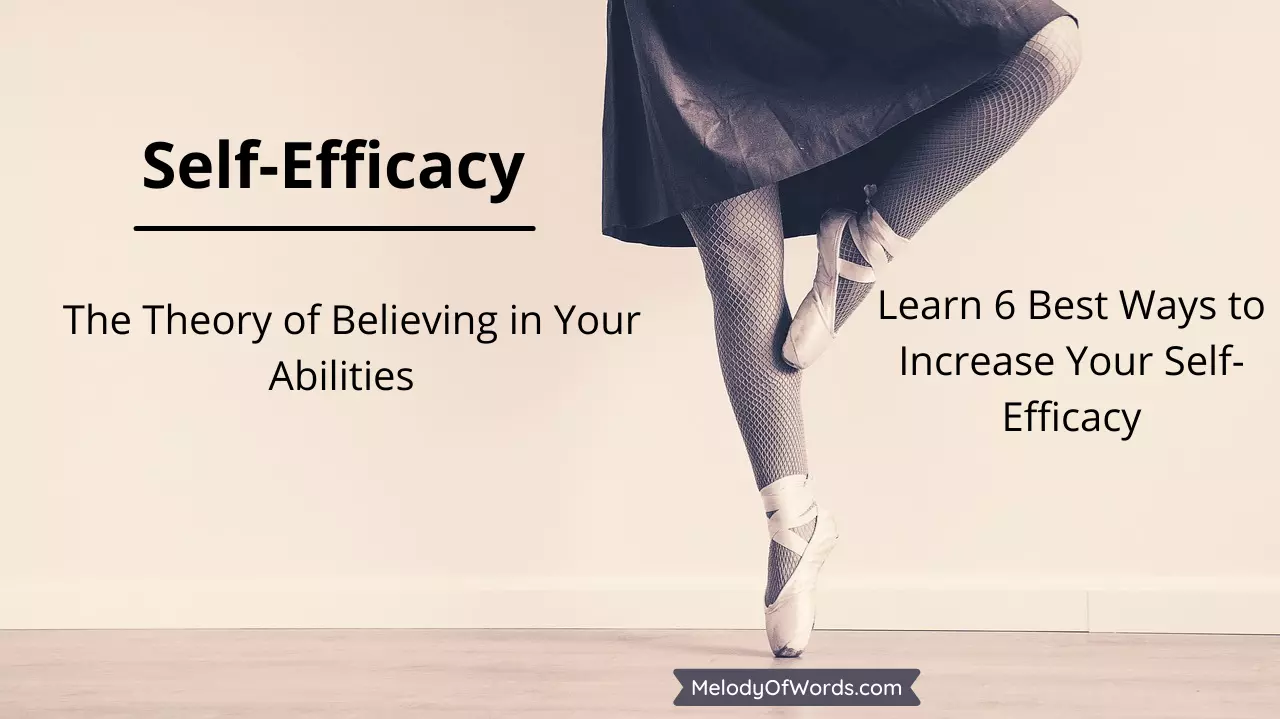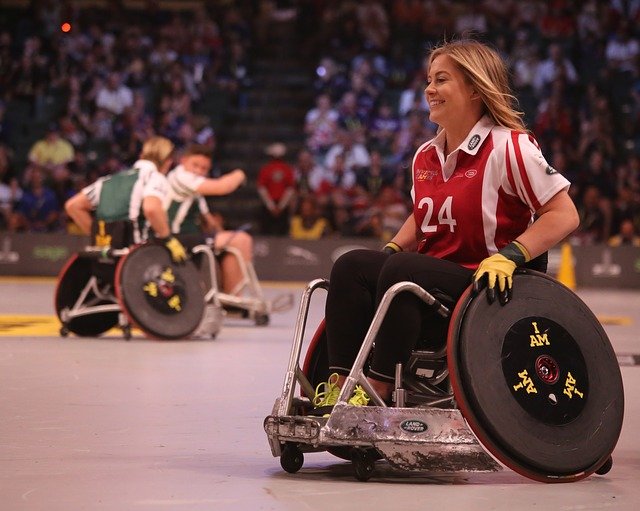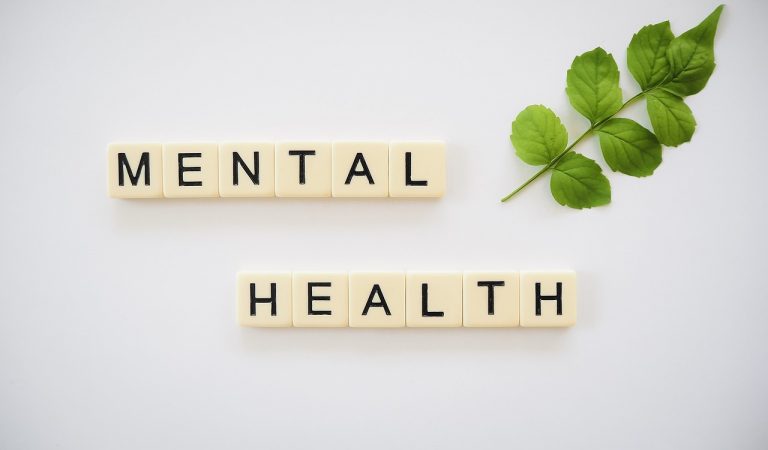Self-Efficacy: The Theory of Believing in Your Abilities | Learn 6 Best Ways to Increase Your Self-Efficacy

What is Self-efficacy:
Self-efficacy refers to an individual’s belief in their own abilities. While having faith that he/she can execute any task with excellence, and perform well in any situation despite having hurdles, and challenges in their life.
Self-efficacy is a tool that boosts self-confidence, which can influence your performance to attain the desired result. People with high self-efficacy are self-assured, they don’t underestimate themselves or their potential. For example– a student who is confident about his preparation will perform well in the test.
Characteristics of People with a Strong sense of Self-efficacy:
- People with high self-efficacy develop deeper interest in the activities in which they participate,
- Form a stronger sense of commitment to their interests and activities,
- Recover quickly from setbacks and disappointments,
- View challenging problems as tasks to be mastered.
Albert Bandura the founder of Self-efficacy Theory:
The theory of Self-efficacy also known as SET was introduced by Albert Bandura (1977), a Canadian-American psychologist and professor at Stanford University. Bandura defined self-efficacy as one’s belief in their capabilities to exercise control over their own functioning, or events that affect their lives.
In Albert Bandura’s words, “Self-efficacy is a personal judgement of how well one can execute courses of action required to deal with prospective situations.”
What are the four Major sources of Self-efficacy:
According to Albert Bandura an individual’s belief in their efficacy are developed by four major sources of influence that are explained below:
1. Mastery Experiences or Personal Accomplishments:
Our brain safe keeps all our experiences, whether good or bad. Therefore, whenever we put ourselves into a new situation, challenge or task. We experience positive or negative emotions based on the old experiences we had, which could influence the outcome of our performance.
This is why we need to master our experiences to increase our self-efficacy. Because having success in mastering a task increases our self-belief in that area, while failure decreases our self-belief.
“Mastery experiences are the most influential source of efficacy information, because they provide the most authentic evidence of whether one can muster whatever it takes to succeed. Success builds a robust belief in one’s personal efficacy. Failures undermine it, especially if failures occur before a sense of efficacy is firmly established” (Bandura, 1997).
Here’s an example of Mastery Experiences:
When a child learns how to ride a bicycle it improves his motor skills, and when he reaches teenage, he feels confident that he will easily learn how to ride a bike. This hike in self-confidence is due to his positive experiences in mastering a similar task, and being able to do it with ease.
How to Master Experiences to Influence Self-efficacy:
Mastery experiences refers to the experience we gain, when we take over a new challenge and are successful at doing so.
Our previous experiences can influence our performance. Therefore, one of the most sought after ways to learn a new skill or to improve one’s performance in a given activity is by practicing it.
Practicing seems to work well in most cases, because when we start making we realise that we are capable of acquiring new skills.
2. Vicarious Experiences:
Another important source of self-efficacy is through secondary experiences provided by social models. Vicarious experiences involve observing other people succeeding at an array of tasks, which motivates you to perform well at that task or activity.
One of the best examples is watching our older siblings, caregivers, relatives, teachers, employers, or famous personalities accomplishing their goals. Due to which, they become our social role models in life.
Since when we see someone who is similar to us doing better in life, we make them our role models.
Here’s an example of Vicarious Experiences:
Athletes who participate and prove their mettle in Paralympic Games are now inspiring many differently-abled people to realise their utmost potential. So they don’t undermine themselves, and believe they aren’t capable of achieving their goals.
Bandura asserts that, “Seeing people similar to oneself succeed by sustained effort raises observers’ beliefs, that they too possess the capabilities to master comparable activities to succeed.”
When one looks up to positive role models in their life, those having a healthy level of self-efficacy. They feel positive about their self, and are confident about executing their tasks.
Also Check: The Power of Introversion: 8 Qualities of Introverts & How to Benefit from It
3. Social and Verbal Persuasion:
A little appreciation goes a long way, and the earlier you administer it, the more likely you are to plant self-efficacy among your kids.
This is why good caregivers and teachers are always polite and patient towards children. Hence, they use encouraging words to boost the morale of children. Because they understand the importance of positive verbal feedback, and how it can help an individual to outperform others.
How Verbal Persuasion can Increase Self-efficacy:
Self-efficacy is influenced by encouragement and discouragement pertaining to an individual’s performance or ability to perform (Redmond, 2010).
This is the reason why motivational speakers keep stressing on removing ‘t’ from “I CAN’T DO IT to I CAN DO IT!”
Because when we believe in ourself it has a positive influence on us, which makes us believe that we have the skill to do a complex task, and are capable enough to reach to the top.
Here’s an example of Verbal Persuasion:
A trainer who motivates his trainees by using positive words like, “You’ve got what it takes, I know you can do it.” Helps his trainees to boost their self-confidence, and to realise their individual talents.
This motivates them to hone their skills, which concurrently benefits the employer as well as the employee. Since skilful and efficient employees reap profit, and bring laurels to their organisation for which they are rewarded with incentives and promotions.
This is why managers give positive verbal feedback to the employees as it enhances their performance which is beneficial for the organisation.
4. Emotional and Psychological States:
Our emotional, physical and psychological state and overall well-being can also affect our self-efficacy, and how confident we feel about our abilities in a particular situation.
For example, if you are struggling with depression or anxiety, one might find it harder to have a healthy level of well-being.
Is it impossible to build self-efficacy while suffering from some of these struggles? Of course not, but boosting your self-efficacy is a much easier task when one is feeling healthy and well (Bandura, 1982).
However, Bandura (1977) states, “It is not the sheer intensity of emotional and physical reactions that is important but rather how they are perceived and interpreted. People who have a high sense of efficacy are likely to view their state of affective arousal as an energizing facilitator of performance, whereas those who are beset by self- doubts regard their arousal as a debilitator.”
Thus, by learning how to manage anxiety and enhance mood when experiencing challenging situations, individuals can improve their sense of self-efficacy.
Benefits of Self-efficacy:
Developing a healthy level of self-efficacy can beneficial in many ways, some of them are stated below:
- High self-efficacy can make you efficient at your work. It can enhance your performance, and boosts academic success.
- Individuals with healthy level of self-efficacy don’t fear challenges, or situations they put themselves into.
- People with high self-efficacy have great mental health, and low stress and anxiety as compared to others.
- They are more comfortable with trying new things such as sport, food, and even learning or integrating into a new culture or environment due to work or education.
- People who naturally are born with a high level of self-efficacy have resilience to adversity.
- According to psychologist Bandura, highly self-efficacious people have healthy habits. They have more self-control, and have lesser chances to develop addiction behaviours or eating disorders.
The Importance of Self-efficacy:
A person’s level of self-efficacy determines— how challenging goals that individual will set for themselves, and the amount of efforts they will put in.
The higher the person’s self-efficacy, the more they think, they are capable of accomplishing a task. The lower their level of self-efficacy, the less they think they have the ability to accomplish the task.
Self-efficacy has relevance in many areas of research but it is most relevant in the area of educational research. Since higher self-efficacy is associated with greater persistence, effort, and intrinsic interest in academic learning and performance.

Researchers have found that student’s beliefs about their own ability to learn determines their aspiration, level of motivation and academic accomplishment. While a teacher’s beliefs in their own ability to teach affects how successful the students will be.
According to researchers, parents can boost their children’s self-efficacy by providing a positive environment that stimulates their curiosity, and also allows them to master experiences.
Also Check: Why Long-Distance Relationship can be Great for Introverts, Loners & People with Social Anxiety
Difference between People with High self-efficacy and Low self-efficacy:
People with a low level of self-efficacy withdraw themselves from difficult tasks, because they see them as personal threats. Such people have low aspirations from themselves, and weak commitment to the goals they choose to pursue.
On the contrary, people with high efficacy handle difficult tasks as challenges to overcome rather than as threats. They set challenging goals for themselves, and maintain strong commitment to them.
Why people with High Self-efficacy win in Life:
We often get to hear the quote, “Some people are born winners,” and that’s true in this case. As we can co-relate it with having higher level of self-efficacy, which makes an individual hungry for achieving their set goal. Thereby, creating a need to build, improve and increase your sense of self-efficacy.
Why?
Because people who have this strong belief feel they are here to achieve greatness, and they won’t stop until they achieve it. They keep hustling but that hustle becomes interesting and satisfying for them.
Because they believe in themselves, and their strengths. Which persuades them to work harder towards their goal because they are sure they will get it. While those with low self-efficacy fail in their mind first, and then in reality.
Bandura posits, “People’s beliefs about their abilities have a profound effect on those abilities. Ability is not a fixed property; there is a huge variability in how you perform. People who have a sense of self-efficacy bounce back from failure; they approach things in terms of how to handle them rather than worrying about what can go wrong.”
So let’s discuss some of the most sought after ways to build and increase self-efficacy, dive into the content below:
6 Best Ways to Build & Increase your Self-efficacy

1. Peer Modelling:
Peer modelling is a concept in which a person demonstrates good social behaviour, and is interested in passing on the same values to another person.
Example of Peer-Modelling:
You recently moved to a new workplace where co-workers are highly competitive. You feel nervous around them, as they ignore your call for help or advice. You sit alone during lunchtime most of the days.
One fine day a colleague who works in another team walks to you to say hello, and has lunch with you. During this small conversation, he tells you about the work ethics of this firm. He answers all your queries, and tells you—you can seek his help whenever you have any issue, because once he was in the same boots.
You start noticing him, how he outshines other employees, because he doesn’t shy from seeking feedback from others, and enjoys learning from new challenges.
Hence, he doesn’t take his work as burden, and values the time and efforts of others as well. His good behaviour, and work ethics inspire you to be as kind and efficient as him.
How to build Self-efficacy through Peer modelling:
If you want to build self-efficacy start with seeing others as examples. You can look up to your parents, siblings, uncle, aunt and peers who exhibit great social, moral, and work ethics.
For example:
If your elder sibling is great in academics and sports, is helpful and knows her duties at home. Due to which she is often praised by parents, faculty, and even strangers for being kind and polite.

Then instead of seeing her as your completion, you can look up to her as a role model, and imbibe a few good qualities from that individual. Since having a positive attitude towards others can take you ahead in life, while having a negative attitude can turn you into a hater.
Peer modelling can be practised at any age. However, the earlier you start, the more chances are that it will increase your self-efficacy.
Why?
Because the brain of a child is like an empty disc, there’s no memory or data in it. Which makes it the best reserviour for collecting new info, and positive experiences to stimulate learning.
Unlike adults, children don’t have a pile of negative memories, or stern beliefs about their own self. Such as: things they are embarrassed about, or the unwanted tags, and labels that society gives you.
Therefore, parents must encourage peer modelling by giving their child, the opportunity to learn social skills from other developing peers through games, and activities.
Many parents encourage peer modelling by setting an example for them, or by giving their young ones the opportunity to learn from their elder siblings.
They don’t compare their children with one another, or start sibling rivalry by pitting them against each other. This not only declines their confidence and level of happiness, but also results in poor mental health of children.
2. Seek Feedback:
Many of us have this wrong perception that a good feedback is when its loaded with praise, as it will give is a boost of confidence. Which is far from real because it kills the whole motive.
Since feedback shouldn’t be viewed as negative or positive in nature. It should be looked upon as— how helpful it is for you to grow, and to correct your mistakes, so you can level up your work. Since feedback is important in building self-efficacy.
In 2015 writers Beattie, Woodman, Fakehy, Dempsey during their work on the role of performance feedback on self-efficacy observed that:
“Self-efficacy and subsequent task performance improves after receiving higher, and more detailed levels of performance feedback.”
For example:
You are aware of your artistic skills, and you enrol yourself in an art school. Where your teacher gives constant feedback, corrects you when you are wrong, and teaches you the skills needed to finesse your craft.
By receiving her constant feedback, you realise where you were lagging, and how much efforts you need to put to hone your craft, so you can make a living out of it.
Importance of Appreciating Feedbacks:
People who take feedbacks in a positive stride have noticeable improvement in their work. Whereas, those who take feedbacks as negative remarks make a lot of mistakes, which could have been rectified earlier. And have no idea whether they should continue doing what they are doing, or should stop then and there.
So always appreciate the feedback given by your teachers, or manager because it will help you to know— what all you need to do to fill in the gaps.
Also Check: 10 Things Men want from Women but are too Stubborn to Ask for
3. Encourage Participation:
Taking active participation in any group activity, work or sport encourages engagement. Since it involves performing, and displaying individual skills, which raises the competition level as every individual wants to outshine the other.
This is the reason why teachers encourage participation of students at a young age by organizing group activities, and holding competitions among kids, for which they are rewarded with sweets or a group cheer.
Benefits of Encouraging participation to Increase Self-efficacy:
Participation is an essential quality for building and increasing self-efficacy among children. Since children learn through observation, and learning from those, who are alike and close to them.
It is observed that students who participate and engage in class activities are more aware and active in their learning. They have higher critical and analytical thinking skills.
They are more confident about the topics they were paying attention to in the class, and have less stress during exams. Because they absorbed more information in regards to the material.
4. Allow People to Make Their Own Choices:
In order to build self-efficacy, you must learn how to be self-accountable so you can be confident about your decisions, and choices. You will always get advice and opinions on your life, work, and marriage.
However, it is in your hands to choose what’s best for you. Because people don’t access your personality, capabilities and your inner talents, while passing on an advice or judgement.
For example:
Backbenchers who are considered as complete failure by school and society for not being good in studies understand at an early age, that books might not be their best friend but experiences can be.
Since they have more knowledge than a topper on— how to deal with people in different situations, and how to be emotionally strong when there’s no support from family.
Therefore, most back-benchers actually succeed in life. Because they don’t chase what they don’t want, and focus on what they can. Hence, they become smart entrepreneurs, good businessmen, and leaders as they learn how to survive in adverse conditions.
Making our own decisions makes us feel responsible, and prepared for consequences that we might face in the future. Therefore, we put our best foot forward because we don’t want to be proved wrong.
5. Start giving Daily dose of Positive Affirmations to Yourself:
Sending positive notes to yourself can be beneficial to your mental health, as it helps in curbing negative thinking. When you start giving positive affirmations to yourself, you start believing in them, which gives you a gentle push to make positive changes in your life.
Giving yourself a daily dose of self-affirmation may also help to promote self-belief, and to decrease stress in our life.
If you always get anxious before a challenging event, or feel unsure whether you’ll be able to cope with the task. Then you need to give positive affirmations to yourself, so you can be confident about your abilities. This in turn will help you to boost your self-efficacy.
6. Imaginal Experiences and Visualization:
In 2013 James Maddux suggested that imaging yourself performing well in a task that you have to accomplish, or behaving effectively in a given situation can help in increasing your self-efficacy.
James Maddux (2013) described “imaginal experiences” as the art of visualizing yourself behaving effectively or successfully in a given situation.”
Imagining yourself doing well in situations you fear gives you a beforehand experience at— what could possibly happen. And the difficulties, and challenges you’ll have to face in that situation for which you mentally prepare yourself.
For example:
Joining a new school and leaving your old friends behind could be mentally tough for children. As they have to form new friendships with new people, and adapt themselves to the new environment.
Therefore, when you visualize yourself making friends, and enjoying the environment at your new school. You start feeling better about the situation, and no longer feel anxious about— how you will do at the new school.
Maddux and Meier, 1995 explained, “In order to enhance one’s own self-efficacy or that of a child, the focus need to be on painting the picture— making success seem as the most likely outcome.
Maddux (1995) hypothesized, imagining yourself at a favourable position is said to increase the level of self-efficacy in that individual. Since they are portraying their goals as achievable, which strengthens their belief in themselves.
Self-efficacy Vs Self-confidence
Self-efficacy is sometimes confused with other terms such as self-esteem and self-confidence. The difference is those terms deal with the general feeling or idea about the topics. Whereas, self-efficacy is about an attitude towards a specific task in a particular context.
A person’s self-concept might be “I am good at Chemistry” but a person’s self-efficacy is about the belief in their ability for a specific task, for example, “I can totally figure out this Chemistry worksheet.”
Therefore, if confidence means having a strong belief, whether it is in a positive or negative context. Then self-efficacy means having a strong, positive belief, that you have the capability, and the skills to achieve your goals.
Let thy spirit be high in love. Namaste
If you enjoyed reading about Self-Efficacy Theory then you might also like:
- The Benefits of Self-Acceptance and How to Practice it
- 10 Reasons why one Chooses to be a Lone Wolf in a World that works well in Groups
- 75 Best Self-Love Quotes that’ll Inspire You to Love Yourself
- 10 Reasons why Introverts love Cloudy Days
- Why Long-Distance Relationship can be Great for Introverts, Loners & People with Social Anxiety
- 15 Major Signs of Toxic Parents & How to Identify them
- Wabi-Sabi: A Japanese Art to Embrace the Change





